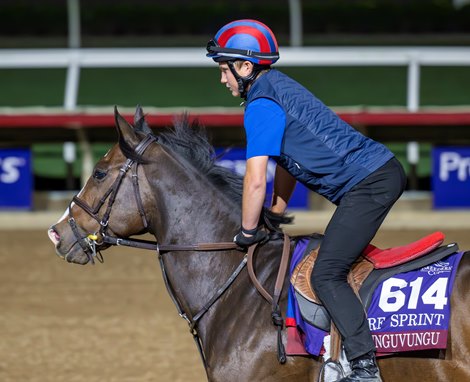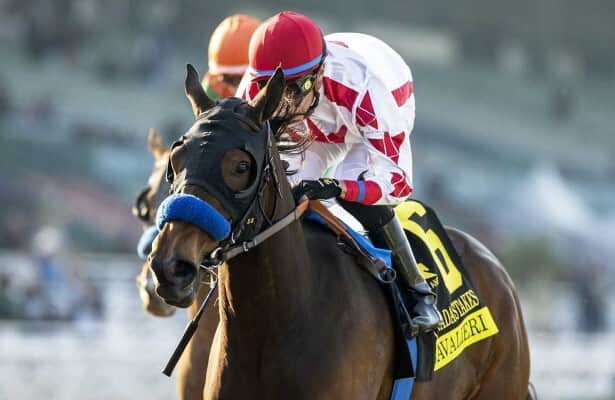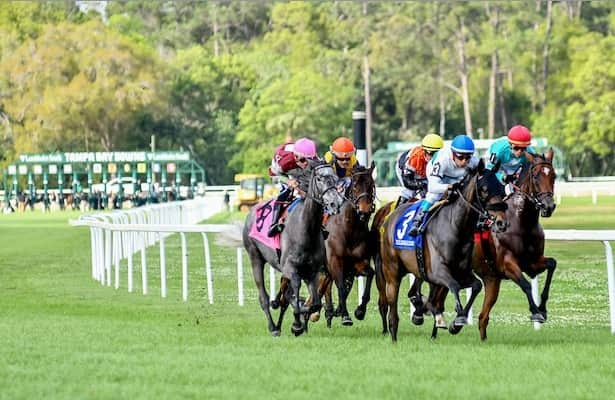The Breeders’ Cup can certainly claim its title as a World Championship event this year with 19 entries from Japan and its usual slew of contenders from Europe. Not to be overlooked in the international cast are a pair of runners carrying the hopes and dreams of South African racing on their backs.
“There’s a lot of excitement,” said Odwa Ndungane, who named Breeders’ Cup Turf Sprint (G1T) contender Isivunguvungu . “The horse racing fan base in South Africa is small, but is growing at a rapid speed. The sport is becoming very popular.”
Hollywood Syndicate’s Isivunguvungu and Cayton Park Stud’s Beach Bomb , who races in the Breeders’ Cup Filly and Mare Turf (G1T), are both dual group 1 winners in their home country. After showing their flashes of talent, both owners wanted to take a shot at the Breeders’ Cup and imported them to the United States this spring.
Beach Bomb trains for the Breeders’ Cup Filly and Mare Turf at Del Mar
Upon arrival, and prior to joining trainer Graham Motion, they had to undergo a strenuous two-month long quarantine.
“The only thing we were able to regulate was what they ate,” Motion said. “Even that was hard because they didn’t want to feed them too much because their environment was so controlled, they couldn’t do much.”
Only walking the shed row for a couple of minutes each day, both horses arrived in Motion’s care in need of their fitness being built back up “from scratch.”
“They’ve both been very classy individuals to train,” Motion said. “They’ve made it easy, they adapted very well.”
Luckily, both horses’ calm and friendly nature helped with their adjustment. Both of their trainers in South Africa, Isivunguvungu’s Peter Muscutt and Beach Bomb’s Candice Bass-Robinson, arrived at Del Mar Oct. 31 to see their pupils for the first time since they left home. They both, with a few tears in their eyes upon being reunited with an old friend, were impressed with how they looked.
“She looks well, she looks happy,” said Bass-Robinson, who trained the now-4-year-old Beach Bomb during her juvenile and sophomore seasons. “She’s a tiny little thing, but she’s got a big heart and a lovely action. She was a pleasure to train, I miss having her.”
Although they were upset to lose one of their stable stars, both Muscutt and Bass-Robinson understood the importance of allowing their trainees an opportunity to showcase South African breeding on a global stage.
“It’s a big knock when you (lose) a champion horse in your care. But for the betterment of South African racing, it’s great to see him (at the Breeders’ Cup),” Muscutt said. “It’s a great credit to South African horses that he’s qualified to run on the international stage. Let’s hope he does us proud.”
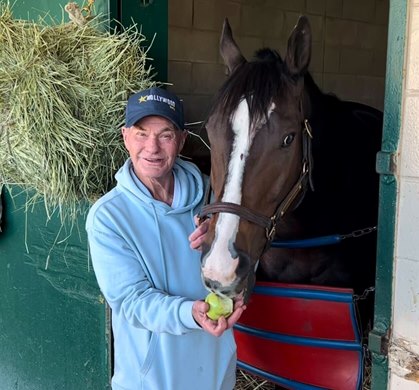
Isivunguvungu is fed an apple by his former South African-based trainer Peter Muscutt at the Breeders’ Cup
His name alone created a large following in South Africa. Isivunguvungu means “storm” in Zulu, a name that Ndungane felt was a perfect fit for the son of What a Winter .
“The name came to my mind because we all know what a storm does,” Ndungane said. “It hits hard and it leaves a mess. I felt like he would be the kind of horse that, when he runs, will be dominant and strong and I just felt like that name would suit him.”
“He’s got a huge fanbase back in South Africa,” Muscutt said. “Everybody’s well behind us back home. His name alone has attracted a multitude of ethnicities to support him. That’s basically what he does when he goes to the racecourse, he’s a storm.”
A native of Zimbabwe, Muscutt comes from a family of jockeys as both his father and brother rode and his son, Daniel, currently rides in England.
Muscutt trained in South Africa years ago but left to pursue opportunities in Singapore and as an assistant to Australian trainer Chris Waller during the years in which Winx became a racing legend.
“I know a good horse when I see it,” Muscutt said.
Isivunguvungu met that mold from the very start.
“He was a natural athlete from day one,” Muscutt said. “All your better horses show you right away, which he did. He was very aggressive as a young horse when he was a colt. He only had two speeds: stop and flat out. Once we gelded him, his racing manners improved.”
Motion has seen those same two speeds during his training, making it difficult to assess how his South African success would translate to America given that he always had to breeze without a workmate.
He answered the call Sept. 7 when entered at Colonial Downs for the 5 1/2 furlong-Da Hoss Stakes, winning by a neck.
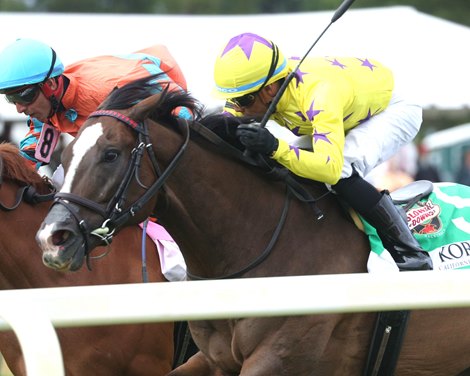
Isivunguvungu wins the Da Hoss Stakes at Colonial Downs
Motion stated that early on, based off the timing of the quarantine, he knew he only wanted to race the 6-year-old once in preparation for the Turf Sprint, and that the way he won off the layoff gives him confidence moving forward.
“He’s got to move forward off his race, which he should,” Motion said. “Having had that race under his belt is important. He’s going to have to improve—there’s no doubt about it—it’s a very competitive group. But he’s a two-time grade 1 winner, so he’s no slouch.”
“He normally makes a significant improvement from his first start to his second,” Muscutt said. “I think he’s going to do South Africa proud. It’s an absolute honor and a privilege to be here witnessing him taking on the world in the Breeders’ Cup.”
Meanwhile, Motion felt that Beach Bomb was going to need a few efforts to round into form. After the quarantine, she spent an additional two weeks at a farm before starting her training.
In two races designed to progress her to her Nov. 2 goal at Del Mar, she finished second in the 1 1/16-mile Violet Stakes at Monmouth Park Aug. 31 and third in the 1 1/4-mile Rodeo Drive Stakes (G2T) at Santa Anita Park. She will travel 1 3/8 miles in the Breeders’ Cup.
“I knew (1 1/16 miles) was too short, but I knew I had to get her started then in order to get here,” Motion said. “The Rodeo Drive fit really well with the progression. She’s going to move forward, but I think the extra furlong is going to help her.”
Bass-Robinson has been working full-time in the industry for over two decades. She started as an assistant trainer to her father, Mike, and took over the operation in 2016 upon his retirement.
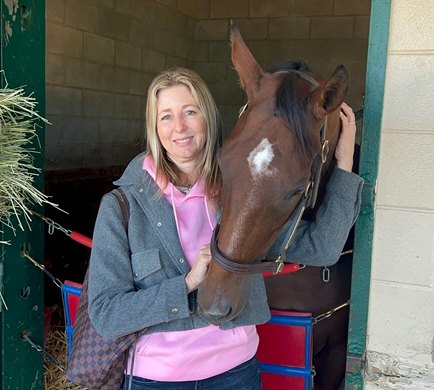
Beach Bomb with her former South African-based trainer Candice Bass-Robinson at the Breeders’ Cup
She took two big hits to her string this winter as Beach Bomb left for the United States around the same time that her 2023 South African champion miler and 3-year-old colt Charles Dickens retired.
“It left quite a gap in my yard when they left,” Bass-Robinson said. “It’s always nice to see them compete on a world stage. I just wish that we in South Africa could travel over easier and do it ourselves. It would make things a lot better for us.”
Shipping horses from South Africa has long been difficult. Earlier this year, the European Union approved direct shipment of South African horses. Since 2011, they needed to stop in Mauritius during a long quarantine period.
KIECKHEFER: EU Approves Direct Shipment of Horses From South Africa
In the United States, horses traveling from Japan or Europe to the Breeders’ Cup or Kentucky Derby (G1) usually clear quarantine in a matter of days, not the two months it took the South African horses.
“We’ve been restricted in our international competition for years and years now,” Muscutt said. “Just to be able to perform on the international stage is a huge attribute to our Thoroughbred industry. Certainly if we were to win, I think the party in South Africa will go on for weeks and weeks.”
According to Bass-Robinson, back home is nine hours ahead of Del Mar, placing the Turf Sprint at 9:41 p.m. and Filly and Mare Turf just after midnight. However, she said many will likely stay up to watch the event, including the filly’s former groom.
That international intrigue is exactly what sets the Breeders’ Cup apart from any other racing contest in America.
“I’m a huge fan of the Breeders’ Cup. This for me is the icing on the cake every year,” Motion said. “It’s about the international competition. This is what makes it so special. That’s what it’s all about.”
